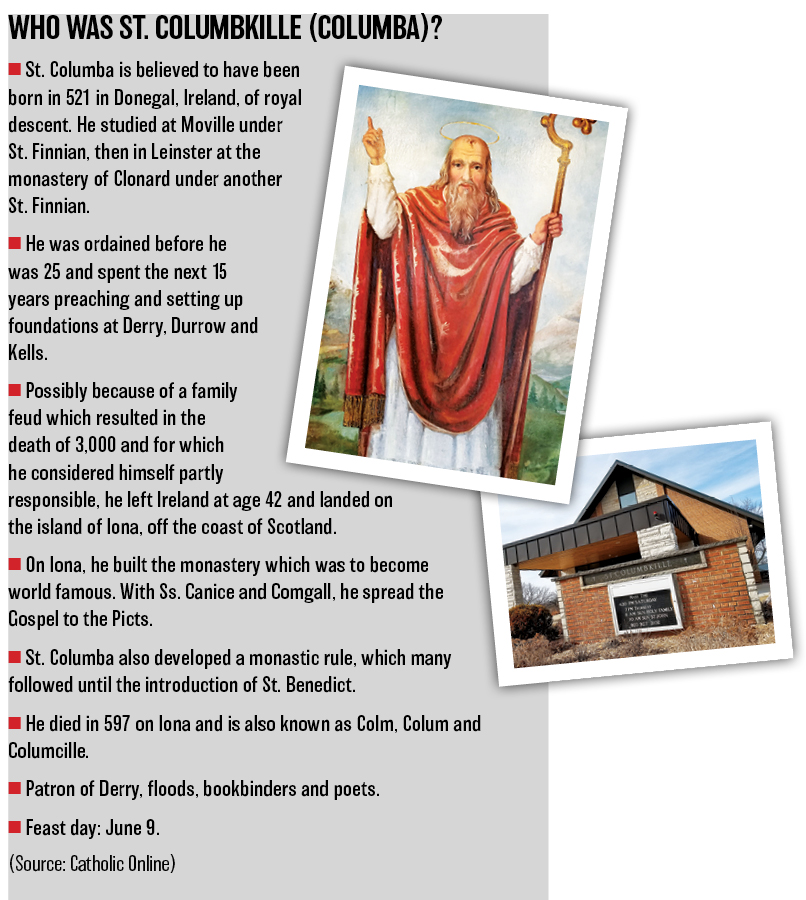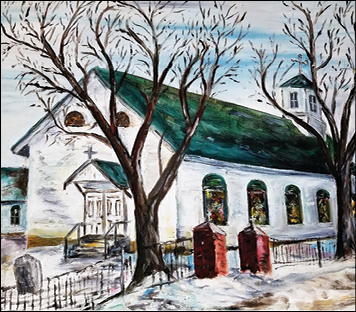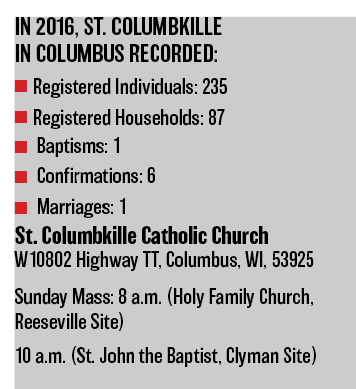
Top: St. Columbkille adorns the walls at the parish named after him. Above: The entrance to St. Columbkille Parish is across the street from a corn field. (Photos by Tom Andrews)
St. Columbkille is a Catholic church located practically in the middle of nowhere, right across the street from a cornfield. Pure farm country in the Dodge County township of Elba, a stone’s throw from the city of Columbus. This beautiful, serene setting is just the way parishioners like Joe Roche love it.
Roche has been part of this church community since he was born 80 years ago. But his roots in St. Columbkille run even deeper than that. The church was founded in 1850 by Fr. James D. Roche, a distant relative.
“He was my great-grandfather’s brother,” Roche said. “In fact, my great-grandfather had three brothers who were priests who came over from Ireland. This church is very much family oriented. It’s a small community and we’re very close-knit. It’s family. The original members of this church were mostly farmers and there was also an old mill, Yeager Mill, in Danville just two miles from here that operated way back 150 years ago. Of course, the mill has been closed for quite some time now. They used to grind rye flour.”
The original church building was completed in 1857 under Fr. Martin Kundig. In 1893, Elba became a mission of St. Jerome’s in Columbus until it became a mission of Holy Family in Reeseville in 1906. The present-day St. Columbkille Church was built and dedicated in 1965 under Fr. Vale Rykoski. The building was renovated in 1994 through former parishioners Ed and Agnes Bolger.
Today, the church is part of the tri-parishes of St. John the Baptist in Clyman, Holy Family in Reeseville and St. Columbkille in Elba. All three of these churches date back to the 1800s and since their inception, all three have had to share a priest. St. John the Baptist originally shared a priest with the Watertown and Juneau Catholic churches.
Holy Family and St. Columbkille have always shared a priest. These three parishes first began working together and sharing a priest in 1999 under the leadership of Fr. John Simon. The parishes retain their individuality while working together and sharing resources to provide for the needs of their collective communities.
“The tri-parishes have a long history of sharing the same pastor, going way back to the beginning,” said Fr. Michael Erwin, who is pastor for the tri-parishes in addition to his duties at St. Katharine Drexel in Beaver Dam. “They’ve shared pastors either with each other or with other parishes. They take to (this arrangement) naturally and have never known another way of doing things.”
What does the tri-parish arrangement look like from the viewpoint of a parishioner? In Joe Roche’s case, it’s been a very good fit for everyone concerned.
“I think it’s been working very well. It enables us to operate the Catechism, the youth program as one, (which includes) the three parishes together,” said Roche. “The kids who don’t get to go to a Catholic school can get their Catholic grade school education together, so it works very well.”
On this particular spring afternoon, the parishioners are rolling up their sleeves for one of their favorite events, the St. Columbkille annual fish fry. Long before cars filled with hungry customers begin to fill the parking lot, crews have set up the church basement dining area while other volunteers prepare bountiful amounts of fish. It’s a feast and an evening of great fun and fellowship. It’s all accomplished with a brand of cooperation and camaraderie that would have made the farming ancestors of this land very proud.

This painting depicts the original St. Columbkille Church, which was built in 1857. (Submitted)
“We do this fish fry once a year and we also do a picnic in the second week of September where we have a pretty good crowd,” said Roche. “We have roast beef on a char-broil grill. We all work together and that goes very well, too.”
“The tri-parishes, St. Columbkille especially, are really good at running their own events,” said Fr. Erwin. “They will coordinate with me and are great communicators with their pastor, but they’re not waiting for me to lead everything. They’re taking the lead on a lot of things such as tonight’s annual fish fry. I show up, greet people and eat fish. They handle everything, and do a good job with it.”
Indeed, that commitment to work with and for each other is well expressed in the following church statement:
“Wherever you are on your faith journey, the communities of Clyman, Elba and Reeseville welcome you to our three parishes. We are three small parishes who rely mostly on volunteer work to accomplish ministry and maintenance work. Our parishes’ missions are to have a movement of growing disciples of Jesus Christ committed to loving God, loving others and making disciples. Orthodox in our Roman Catholic faith, we seek to creatively serve the New Evangelization, by bringing the unchurched in our community to Christ.”
As Fr. Erwin reflects on the parishioners at St. Columbkille today, he said that, “This particular church is young and it’s one of the youngest per capita parishes in the entire archdiocese. Even though we may have 100-110 people on a Sunday morning, at least 25 percent of them are children or teenagers. So, it’s a very young parish and very active with a great can-do attitude. We have a very strong women’s group, a strong men’s group and a lot of parish pride.”
Even as he continues to manage the needs of three other churches beside St. Columbkille, Fr. Erwin has a distinct vision for where he wants to see this parish go in the next five years and beyond.
“The parish itself wants to continue to grow in evangelization and is very much consistent with the Synod goals that we’ve been working on as an archdiocese. These parishes and St. Katharine Drexel very much look forward to the Amazing Parish Conference coming up in October because that’s really where they wanted to go next: to be better at praying with each other, better about talking with each other and being truly intentional disciples. They’re very excited because their goals are very much aligned with where the archdiocese’s goals are
right now.”
Every church community has its own distinct flavor, its own personality.
Fr. Erwin wants people who might one day pay this church a visit to know that this is a great place for families to worship, and it’s all in a setting that’s hard to beat.
“This parish is literally in the middle of a cornfield, so it has a wonderful charm to it,” he said. “It’s beautiful when you look out the front door and it’s a lovely location with a long, strong history. This parish has had a long history of more than 150 years and it’s been a very sturdy parish with very good family involvement. They’re good at passing along their faith from one generation to the next. They’ve been a very stable parish and tend to be more on the traditional side. That traditional aspect allows them to be innovative. This parish is very interested in international mission work. It’s very interested in what’s happening on the cutting edges of Catholicism in the U.S., but their more traditional background allows them to pass on more easily their faith from one generation to the other.”
